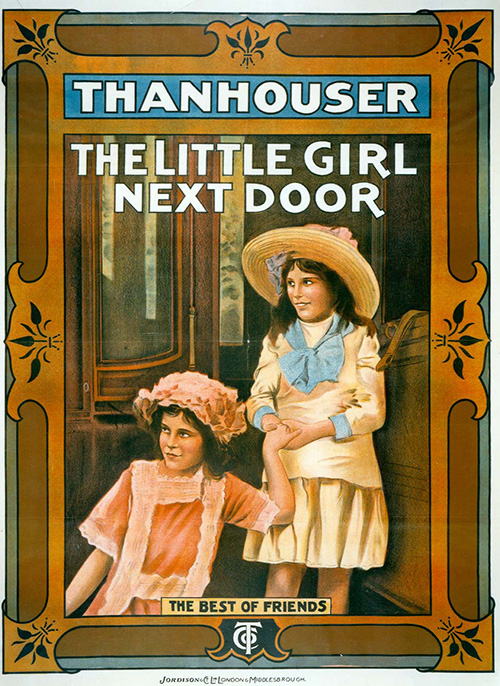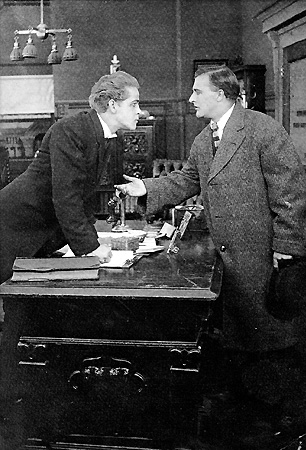 Volume II: Filmography
Volume II: Filmography Volume II: Filmography
Volume II: Filmography

Poster Image Courtesy Library of Congress

Production still with William Russell (L) and William Garwood (R). Courtesy of the Academy of Motion Picture Arts and Sciences. (F-511)
November 1, 1912 (Friday)
Length: 1 reel
Character: Drama
Director: Lucius Henderson
Scenario: Philip Lonergan
Cast: William Garwood (the husband), Marguerite Snow (the wife), Marion and Madeline Fairbanks (Helen Randall and Ruth Foster), William Russell (the other father)
Note: The scenario is believed to have been Philip Lonergan's first script for the Thanhouser studio.
ARTICLE, The Moving Picture World, November 2, 1912:
"Oh, it looks very simple in the picture but, as a matter of fact, it wasn't such an easy thing to film. Take the scene supposed to take place inside an automobile in Thanhouser's The Little Girl Next Door, released Friday, November 1. You witness the 'action' in the auto and either surmise it a genuine auto interior - or isn't. At any rate you take what you see for granted, since there are so many films these days, and so many realistic effects in them, that all things seem easy to the picture producer. The particular scene in The Little Girl Next Door was photographed inside a very real auto. A car with a certain special 'body' had to be secured from an automobile manufactory, transported to New Rochelle, disassembled so that the photographer could focus his machine properly on the interior, reassembled and then shipped back to the maker. Oh, the finished film as you see it in the theatre, and to the tune of easy-going music, makes it all appear most simple, but if you say 'simple' to the producers of the scene, you will lose your life!"
SYNOPSIS, The Bioscope, March 20, 1913:
"Two children get into a boat, unobserved by their elders, and drift into the lake. Suddenly the boat capsizes and the two children hang on to the gunwale. One of the children is saved by its father, the other child assuring him that she will be safe until he returns. Returning with the child's father, he finds that the little tot has slipped from the boat and is drowned. The loss of the child makes the two fathers enemies, and one of the men becomes ruined by a merciless step that has been taken. The daughter of the ruined man takes the matter into her own hands, and the lonely man and wealthy financier learn the lesson of forgiveness."
SYNOPSIS, The Moving Picture World, October 26, 1912:
"Helen Randall and Ruth Foster were little tots. The two children lived side by side on one of the fashionable streets in New York City. One day Helen and her parents were starting for the park when the little one suggested that they invite Ruth to go with them. The idea pleased them all, and as to Ruth, she was in an ecstasy of delight. She skipped down the steps into the Randalls' automobile, and her father (a widower), watching her as the machine whizzed off, realized more than ever the little treasure he possessed. At the park the two children got into a boat unobserved by their elders and drifted into the lake. In total ignorance of their peril they frolicked about the flimsy craft until it suddenly capsized and two little figures were clinging to the gunwale. Randall swam out to the boat. Even his love for his child made him hesitate to take her to the shore first until the little Ruth assured him that she was safe, that she would stay on the boat until he returned. But when he returned, and with him her frightened father, the little form that they brought to land was still. The child had slipped from the boat and drowned while he brought his own child to safety. The loss of his little girl made Foster almost frantic, and he became as vindictive as an enemy to Randall as he had been a friend. A power in Wall Street, step by step he smashed the latter back in the merciless warfare of the street, until Randall, innocent of wrong though he was, stood on the brink of ruin. But when all hope was gone, when he had brought himself to looking upon a life of poverty with the resignation borne of necessity, his daughter took the matter into her own hands, and John Foster, the wealthy financier and lonely man, learned the lesson of forgiveness."
# # #
Copyright © 1995 Q. David Bowers. All Rights Reserved.